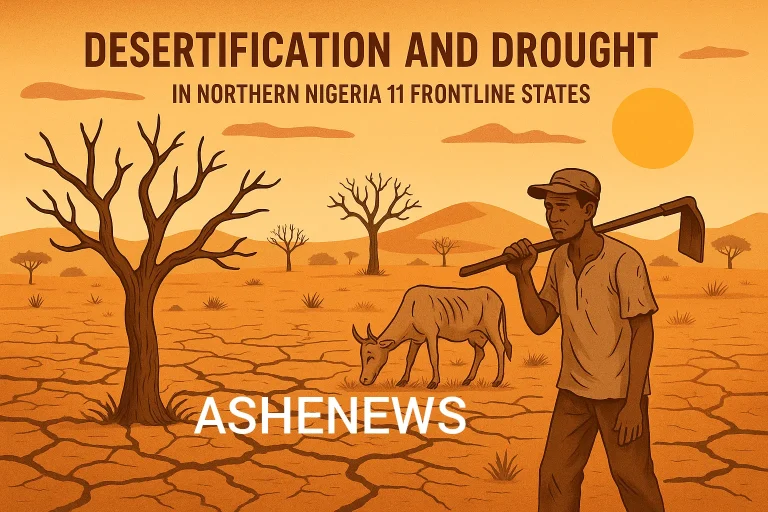Sokoto State Government, through the Ministry of Environment, on Tuesday, commemorated the 2025 World Day Desertification and Drought Day.
ASHENEWS reports that the World Day to Combat Desertification and Drought, observed by the United Nations and linked to the United Nations Convention to Combat Desertification (UNCCD), is commemorated annually on June 17th. The day serves to raise awareness about desertification and drought, highlighting the importance of international efforts to combat these issues and promoting solutions for preventing desertification and recovering from drought.
Nigeria has continued to reiterated its commitment to tackling the twin challenges of land degradation and climate-induced water scarcity. This year’s theme, “United for Land: Our Legacy. Our Future.”, resonates strongly with the country’s environmental priorities, particularly in the arid northern regions, where desertification continues to threaten agriculture, water sources, and rural livelihoods.
The UNCCD leads public awareness campaigns to educate individuals about the causes and impacts of desertification and drought and events are held to showcase best practices, share knowledge, and encourage community involvement in sustainable land management.
During the commemoration event in Sokoto, the Director of Environment in the Ministry of Environment, Mustapha Bello noted that, in spite of efforts by agencies like the Great Green Wall (GGW) and others, desertification and drought have continued to exacerbate, a devolopment that calls for the need for state governments to identify causes and aways to mitigate the challenges.
He attributed human actions as the one of the causes of desertification.
Experts warned that if not urgently addressed, desertification could displace millions across the Sahel region, exacerbating poverty, migration, and conflict.
In his paper presentation, Dr Abubakar Muhammad Gumi of the Plant Science Department, Faculty of Chemical and Life Science, Usmanu Danfodiyo University Sokoto, commended on the World Bank-supported Agro-Climatic Resilience in Semi-Arid Landscapes (ACReSAL) project.
“ACReSAL addresses the complex interlinkages between climate change, environmental degradation, and socio-economic vulnerability. Through integrated interventions—ranging from reforestation and gully reclamation to water conservation and community-based land restoration—the project is building resilience against the harsh impacts of drought and desertification.”
In Sokoto State, for instance, the ACReSAL project has commenced extensive land restoration activities, planting native drought-resistant trees, promoting sustainable farming practices, and empowering local communities to manage their natural resources.
“This is more than just an environmental effort; it’s about securing food, water, and economic stability for future generations,” said Dr Gumi.
Summing up, Gumi stressed that desertification and drought pose a grave threat to livelihoods, food security, and ecosystems—especially in vulnerable regions like northern Nigeria.
“These environmental challenges degrade fertile land, deplete water sources, and increase poverty and forced migration. To combat this growing crisis, it is imperative for people to embrace sustainable land practices, plant trees, conserve water, and support local initiatives that restore degraded land. Individual actions, when multiplied across communities, can create a powerful force for environmental healing.”
It is imperative for governments at all levels to prioritize investment in climate resilience, particularly in the 11 frontline states most affected. This includes enforcing land-use policies, funding reforestation and irrigation projects, supporting climate-smart agriculture, and collaborating with international partners for technical and financial assistance.
The fight against desertification and drought is not just an environmental issue—it is a battle for survival, justice, and future prosperity. Urgent, united action is needed to protect both people and the planet.
As global attention focuses on the urgent need for sustainable land use, Nigeria’s actions this year serve as a powerful reminder that solutions are within reach. With continued support from development partners and increased community engagement, the fight against desertification and drought is gaining momentum—one tree, one community, and one restored landscape at a time.


